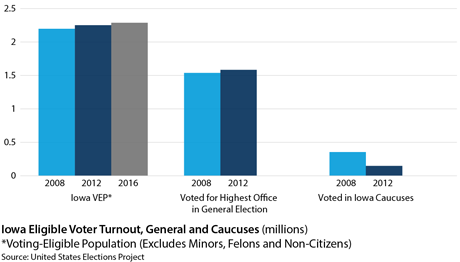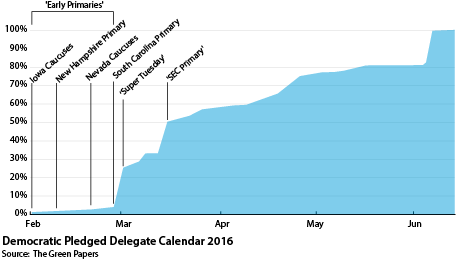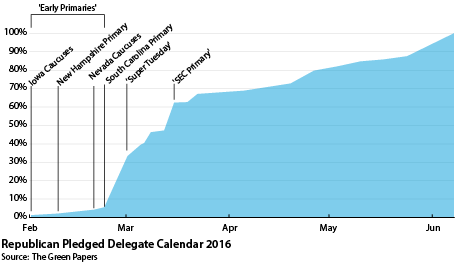US primary process will weaken Republicans
The Iowa caucuses today begin the primary season for party presidential nomination contests
The Democratic and Republican Iowa caucuses will be held today, the first contest of the presidential nomination process. Traditionally, early successes in the nomination process -- particularly Iowa, New Hampshire and South Carolina -- can add momentum to a candidate's nomination campaign, through increased media coverage, elite endorsements and campaign contributions. In the 2016 election cycle, media coverage has focused on the Republican race, where a large field and unprecedented levels of discord have dominated headlines. The Democratic race has come down to former First Lady, Senator and Secretary of State Hillary Clinton against Vermont Senator Bernie Sanders.
What next
Clinton is likely to win the Democratic nomination and will probably campaign in the general election with a policy platform that is largely an extension of President Barack Obama's agenda. Barring an unforeseen collapse in one of the current candidates in the Republican field, their nomination process will last until June 7 and may be settled at the convention. The lengthy primary campaign dominated by appeals to the narrow conservative base of the Republican Party and broader demographic trends poise Clinton for a general election win in November.
Subsidiary Impacts
- Speaker of the House Paul Ryan may use the election-season window to pass legislation on trade or criminal-justice reform.
- Republicans may lose key seats in the Senate if they nominate Trump or Cruz.
- The Senate may trigger a constitutional crisis in an election year if it announces that it will no longer confirm Obama's judicial nominees.
Analysis
The Iowa caucuses mark the beginning of the primary election season, which concludes with the parties' nominating conventions in July.
Relative turnout levels are the key indicator, rather than which individual candidate wins, as historically high voter-participation in the highly constrained primary process would mark a broader coalition favouring 'outsider' candidates with non-traditional voting bases within their respective parties.
Democratic race
Clinton has faced a sharper-than-expected challenge from Sanders, whom many in the party considered a 'protest' candidate. He would be the oldest president to assume office, he had not been a member of the Democratic Party (sitting as an independent in Congress) and has little experience in foreign policy -- the area in which the president has the most freedom of action.
Despite her presumed front-runner status, Clinton has numerous vulnerabilities among the Democratic base, including her ties to Wall Street, unpopular vote for the Iraq War as a senator and rapid accumulation of personal wealth after leaving the White House in 2001.
Despite Sanders's lead in some polls, Clinton should be seen as the heavy favourite, especially given her reported lead among Democratic 'superdelegates' -- party officials free to choose their preferred nominee.
While Sanders has high net favourable ratings among voters and is considered more 'authentic' than Clinton by the party's progressive base, he is a much weaker candidate than Obama in 2008.
Obama benefited from a more favourable Democratic environment, given the unpopularity of Republican incumbent George W Bush, which encouraged voters to downplay concerns about electability. As an 'outsider' candidate, Obama also had a better grasp of foreign policy than Sanders, who is running largely as a candidate on income inequality (see UNITED STATES: Clinton faces progressive challenge - October 16, 2015).
While Sanders could win in the smaller early races of Iowa and New Hampshire, Clinton is likely to win in the more diverse electorates of South Carolina and Nevada, potentially opening a major lead after 'Super Tuesday' on March 1.
21.3%
Proportion of Democratic delegates available on March 1
Outlook
The race with Sanders has already led Clinton to adopt more left-wing policies than she has been known for, particularly on trade and financial regulation. These will probably remain part of the Democratic platform throughout the general election.
Republican race
The Republican race has been thrown into turmoil by Donald Trump's solidity in opinion polls (despite controversial statements on immigration and personal attacks on his critics) and by the poor showing of sitting mainstream politicians with the backing of the Republican Party's traditional donor base.
Trump is able to command such support by bringing in new voters -- primarily non-college-educated working-class whites -- into the primary process.
By tacking right on immigration and other social issues, Trump also taps into the visceral dislike of election-orientated and relatively moderate Republican elites -- primarily in the deeply unpopular 114th Congress -- among the rank-and-file membership of the party (see UNITED STATES: Politics will hinder immigration reform - October 8, 2015).
80%
Gallup disapproval rating of Congress in January 2016
Recent opinion polls have shown majority support in most polls for candidates who have either no governing experience (Trump, Ben Carson and Carly Fiorina) or position themselves as anti-government (first-term Senator Ted Cruz of Texas).
The reasons for the success of 'outsider' candidates in the Republican race are many, including:
- voter disillusionment after the survival of Obamacare despite Republican wins in 2010 and 2014;
- mistrust of the Republican establishment's ties to business after the financial crisis of 2008 and the Citizens United Supreme Court decision of 2010; and
- racial polarisation of political parties leading many disenchanted white voters to remain Republicans and vote for Trump, rather than switch to the Democratic Party.
Compounding the unpredictable nature of the race is the role of Cruz, running second to Trump in many national polls. Cruz stems from the hard right of the Republican Party and faces the animus of most of his Republican peers in Washington.
Mainstream Republicans have been searching for a candidate who can run as a credible anti-Trump/Cruz alternative.
However, the search has not yet borne fruit, as the 'establishment lane' of electoral support is divided between a number of candidates, and the party's post-2012 rules for delegate allocation make it difficult to mount a late insurgency against a front runner.
However, a mainstream candidacy could survive a number of early primary losses. Owing to the slow process of delegate allocation, it is not until March 1 that a considerable number of delegates are awarded, leaving four elections before there are real consequences for the nomination process.
Furthermore, the March 1-15 elections will award delegates on a proportional basis, preventing one candidate from running away with the lead.
The most likely result for the race is that Trump and Cruz win early primaries as the rest of the field thins to two candidates. At the moment, the most likely are Florida Senator Marco Rubio and former Florida Governor Jeb Bush.
Outlook
An extended primary with Trump or Cruz leading will push all candidates rightwards as they compete for the votes of party members committed enough to vote in primaries. This has already led to a complete abandonment of Republican interest in immigration reform that offers a path to citizenship, the plan which passed the Senate in 2013.
This would lead to the alienation of many key voting groups, especially Latinos and women. As Obama won two elections convincingly and demographic shifts in the population favour the Democrats, an inability to reach out to Democratic-leaning groups would probably doom the eventual Republican nominee.
There would be only four months for the candidate to moderate their most extreme statements enough to be viable as a general election candidate, an improbable prospect.



_350.jpg)